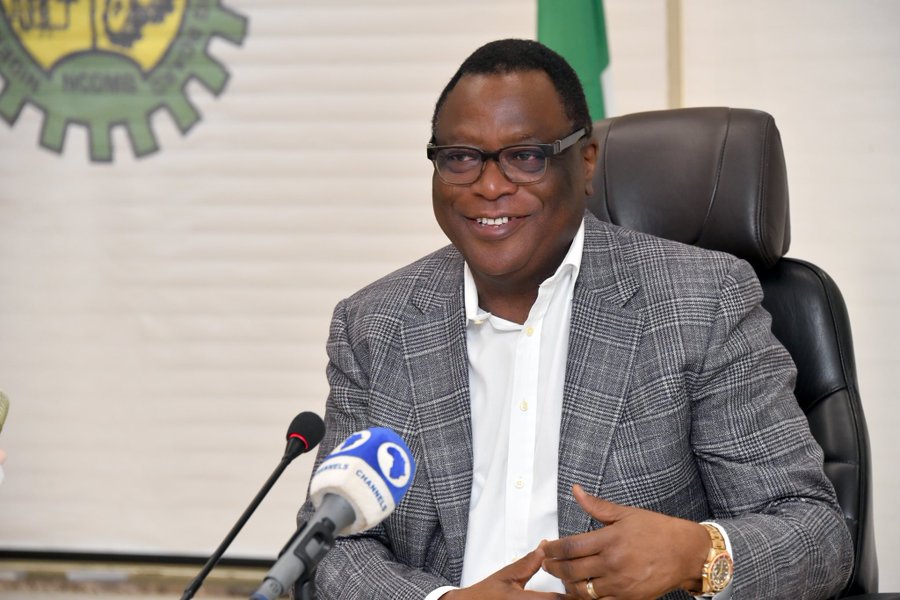Photo caption: Executive Secretary NCDMB, Felix Ogbe
The Executive Secretary of the Nigerian Content Development and Monitoring Board, Felix Ogbe, has called on international oil companies to engage local companies for their projects.
Ogbe stated this yesterday at the ongoing Nigerian Oil and Gas Opportunity Fair organised by the NCDMB in Yenagoa, Bayelsa State.
Themed ‘Driving Investment and Production Growth: Shaping a Sustainable Oil and Gas Industry through Indigenous Capacity Development’, the NOGOF 2025 had in attendance stakeholders in the oil and gas industry.
In his welcome address, Ogbe said the sale of onshore assets by the IOCs to indigenous companies is a bold step and strategic shift towards deeper local participation and value retention, urging the local companies not to relent.
“I use this opportunity to congratulate Renaissance, Seplat, Oando, and all our indigenous companies on their milestone achievements. I encourage you not to relent. We must sustain the momentum and come together to support this local content stride in terms of procurement, capacity building, knowledge transfer, job creation, and mentorship for upcoming investors,” he stated.
With opportunities like UBETA, Bonga North, and Zabazaba coming onstream, Ogbe noted that great opportunities are provided for Nigerian companies to further demonstrate their capacity, asking the IOCs not to outsource.
He said, “I encourage the IOCs to make a conscious effort to engage local companies in line with the provisions of our laws. Let’s ensure we use what we have at home first before we ‘cannot go outside.
“Let me be clear, no nation achieves energy security or industrial prosperity by outsourcing its core capabilities. Our strength must lie in the expertise of our people, the enterprise of our local businesses, and the robustness of our institutions. I cannot emphasise this enough!
“To this extent, I charge the IOCs and indigenous operators to revamp our Human Capital Development initiatives. We are mindful of the numerous trainings already conducted. The need to quickly deliver more training is critical. With the increase in activities in the oil and gas industry, I urge that we step up our training. I look forward to your support in ensuring that all trainings under appropriate projects are conducted immediately.”
Ogbe recalled that the NCDMB created a 10-year road map to deepen local participation and increase the participation of Nigerians in the activities of the oil and gas industry.
“Today, we have moved from five per cent in-country value retention in 2010 to 56 per cent in December 2024,” he disclosed.
The executive secretary noted that as the global energy landscape evolves, Nigeria must position itself as an attractive hydrocarbon investment destination and also as a beacon of sustainable development powered by local companies.
“Since the enactment of the NOGICD Act in 2010, we have made remarkable progress in building the capability and capacity of Nigerians and of Nigerian companies, attracting critical investments in-country, and enhancing value retention,” he stressed.
Ogbe explained that in a bid to revitalise Nigeria’s oil and gas sector, President Bola Tinubu signed three executive orders that were designed to leverage the nation’s resources and position Nigeria as the preferred investment destination for the oil & gas sector in Africa.
He posited that what the board does has been further reiterated by Tinubu’s newly introduced ’Nigeria First Policy’, which he described as a bold and forward-thinking move for the Nigerian content drive.
He added, “Today, we are proud to say that Nigerian content has moved from aspiration to execution. From well-equipped ISO-certified fabrication yards in Port Harcourt, Warri, and Lagos to modular refineries in Imo and Delta States, and from pipe mills to marine vessel ownership, Nigerians are not just participating—they are delivering at the highest level.
“However, the real opportunity lies ahead. As we move towards rebalancing our economy and increasing oil and gas production, it is imperative that we deepen indigenous participation, not only in upstream services but across midstream and downstream operations.
“At NCDMB, we remain unwavering in our commitment to creating the right policies, providing funding mechanisms, and partnerships to support Nigerian businesses. I am happy to announce that the board, alongside other stakeholders, recently formed the Africa Energy Bank with the proposed Headquarters in Abuja. The Bank will be open for business before the end of the second quarter in 2025. We are hopeful that this will create more funding availability for local companies.”
In her words, the Special Adviser to the President on Energy, Olu Verheijen, also emphasised the need to engage local capacity.
Verheijen said there is an unstoppable rise of Nigerian energy champions, from the world’s largest single-train refinery built with African capital and vision to local firms acquiring onshore ventures once held by international companies.
She expressed satisfaction that Nigeria is moving from dependence to production and from extraction to value creation.
She said, “This is the Nigerian presidential vision: a country that produces, a country that builds, one that leads. But let me be clear, local content is not a destination. It is a pathway. What matters is not just policy or performance. Every dollar invested must translate into jobs. Every project must translate into prosperity.
“The value must stay here, in our communities, in our companies, in the hands of our people. We must stop exporting our potential and start industrialising it. Let Nigerian steel go into our pipelines. Let our engineers, our welders, and innovators power this economic transformation. Let our young people see a future in Nigeria.
“The Renewed Hope Agenda is not abstract. It is about building an energy sector that works for Nigerians. One that finances roads, that powers hospitals, that drives our industrialisation and creates sustainable jobs in Yenagoa.”
The Minister of State for Petroleum Resources (Oil), Heineken Lokpobiri, said Nigeria has a bigger role to play in energy security in Africa.
According to him, whatever Nigeria cannot achieve will not be achieved in Africa.




